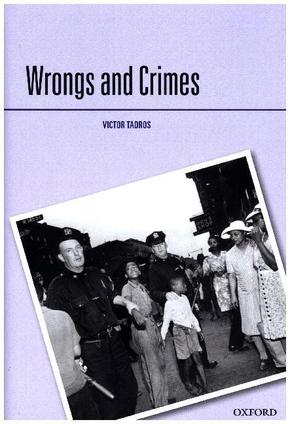| Verlag | Oxford University Press |
| Auflage | 2016 |
| Seiten | 360 |
| Format | 17,6 x 24,3 x 2,4 cm |
| Print PDF | |
| Gewicht | 708 g |
| Artikeltyp | Englisches Buch |
| ISBN-10 | 0199571376 |
| EAN | 9780199571376 |
| Bestell-Nr | 19957137EA |
Offering a philosophical investigation of the relationship between moral wrongdoing and criminalization, this book provides an account of the nature of moral wrongdoing, the sources of moral wrongdoing, why wrongdoing is the central target of criminal law, and the ways in which criminalization of non-wrongful conduct might be permissible.
The Criminalization series arose from an interdisciplinary investigation into criminalization, focussing on the principles that might guide decisions about what kinds of conduct should be criminalized, and the forms that criminalization should take. Developing a normative theory of criminalization, the series tackles the key questions at the heart of the issue: what principles and goals should guide legislators in deciding what to criminalize? How should criminal wrongs be classified and differentiated? How should law enforcement officials apply the law's specifications of offences?
The sixth volume in the series offers a philosophical investigation of the relationship between moral wrongdoing and criminalization. Considering they justification of punishment, the nature of harm, the importance of autonomy, inchoate wrongdoing, the role of consent, and the role of the state, the book provides an account of the nature of moral wrong doing, the sources of wrong doing, why wron g doing is the central target of the criminal law, and the ways in which criminalization of non-wrongful conduct might be permissible.
Inhaltsverzeichnis:
1: Introduction
Part A: Punishing Wrongs
2: Wrongness and Responses
3: Wrongdoing and Respecting Value
4: The Punitive Response
5: Personal Practical Responsibility
Part B: Criminalization in Principle
6: How Not to Think about Criminalization I: Restrictive Principles
7: How Not to Think about Criminalization II: Justificatory Principles
8: Political Liberalism and Criminalization
9: The Core Case of Criminalization
Part C: Wrongs, Harms, and Consent
10: Harm: Its Currency and its Measure
11: The Value of Consent
12: Coercion and Consent
13: Error and Consent
14: Consent to Harm
Part D: Further Reaches of the Criminal Law
15: Further Beyond Harm
16: Intentions and Inchoate Wrongdoing
17: Possession, Prohibition, and Protection
Rezension:
...the book worth reading. Arudra Burra, Department of Humanities and Social Sciences Indian Institute of Technology-Delhi,

